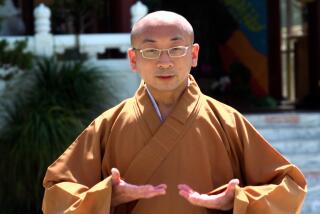Monks Seek Way to ‘Clear Muddy Water’ Amid Korean Tensions
- Share via
SEOUL, South Korea — “To clear muddy water, you must let it settle,” said the Buddhist monk in the light gray robes. “You cannot stir it up.”
The monk, whose lithe movements and smooth-shaved head belied the creases in his forehead, was commenting on the political situation both in South Korea and in his own order of Buddhist monks.
Outside the reception room with its rice-papered floors, which visitors enter after removing their shoes, an anti-government rally led by monks was supposed to start soon.
But the administrator of Chogye Temple, national headquarters of a major Buddhist sect, said the temple had not given permission to stage the rally. Nor had it denied permission, he added. “My duty is not to create controversy with words but rather to accommodate differences,” he said.
Like nearly everyone commenting about politics in a country run by a former army general who seized power in a coup and retains controls on freedom of speech and the press, the monk refused to give his name or even his age--although he admitted to being about as old as his visitor, 50.
The rally was to have highlighted another day of calls for democracy and protests against President Chun Doo Hwan and his military-backed regime. A half-dozen anti-government monks were on hand in the temple yard, prepared to lead it if anyone showed up. No one did.
Police formed a three-layer human wall across the narrow alleyway entrance to the temple and blocked the passage of all but monks, nuns and women believers coming to attend a regular three-hour Saturday afternoon study session unrelated to the protest.
About 600 monks of the order’s 3,000-plus members have joined the National Coalition for a Democratic Constitution, together with Protestants, Catholics, dissident groups and the main hard-line opposition Reunification Democratic Party. The coalition, established last month, has pledged to lead a movement seeking to establish democracy and end military domination of politics in South Korea.
The senior monk said the affiliation of some of the monks with the anti-government coalition “makes it appear that Buddhists are against the Establishment.”
“But that is inherently impossible. From the very nature of Buddhism, it is not our place to decide who is right or who is wrong,” he said. He noted that Buddhists, historically, had never engaged in political battles in India, China, or, for that matter, in 1,600 years in Korea.
Although he refused to condemn the new activist group, the first that has ever joined a political cause here, he did criticize them.
“I look at them as individuals driven by personal beliefs,” he said sympathetically. But he added that most of the activists are in their 40s or younger.
“In the West, 40 is old. But in Buddhism, you are still in training. You are not yet learned enough to preach,” he said.
The monk also expressed unhappiness over the division of his order into political and apolitical factions.
“When the sweet flowery smell inside the house appears on the outside as smoke, something is fundamentally wrong,” he said.
Religion, he added, teaches fundamentals. “When people are preaching with words, claiming they are right, they are not practicing religion.”
Outside, where one of the largest concentrations of riot police, combat police, and other special police units seen since protests began June 10 gathered to squelch the rally, about 150 monks did join the ranks of students in a drizzling rain to defy police in the streets and shout anti-government slogans demanding democracy. Police detained 20 of the monks.
But the protest, involving about 1,000 people in all, turned out to be one of the smallest yet, a poor reflection on the activist Buddhists’ contribution to the opposition coalition.
Unlike earlier demonstrations, these protesters failed to draw applause from onlookers.
One middle-aged man in working garb, seeing a foreign reporter’s armband, volunteered in GI English a condemnation of the demonstration: “Students Number 10; Korea Number 1.”
Crowds remained silent for the most part and dispersed peacefully when platoons of policemen asked them to move on. Pepper gas, a virulent form of tear gas, was fired only at those protesters in the streets.
But one woman in her early 60s, who was lifted from the street and set down on the sidewalk by a combat policeman, raised her folded umbrella and smashed it over the policeman’s helmet when he turned his back on her. Other pedestrians had to pull her away to stop the fight.
Inside, one of the activist monks waiting to lead the rally that never began said he did not mind that the temple administrator disagreed with his views.
“In our order, we have democracy,” he said.
More to Read
Sign up for Essential California
The most important California stories and recommendations in your inbox every morning.
You may occasionally receive promotional content from the Los Angeles Times.













